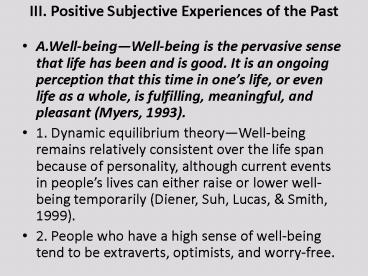III' Positive Subjective Experiences of the Past - PowerPoint PPT Presentation
1 / 7
Title:
III' Positive Subjective Experiences of the Past
Description:
... is an ongoing perception that this time in one's life, or even life as a whole, ... c. The exception to this rule is for people with multiple disabling conditions. ... – PowerPoint PPT presentation
Number of Views:21
Avg rating:3.0/5.0
Title: III' Positive Subjective Experiences of the Past
1
III. Positive Subjective Experiences of the Past
- A.Well-beingWell-being is the pervasive sense
that life has been and is good. It is an ongoing
perception that this time in ones life, or even
life as a whole, is fulfilling, meaningful, and
pleasant (Myers, 1993). - 1. Dynamic equilibrium theoryWell-being remains
relatively consistent over the life span because
of personality, although current events in
peoples lives can either raise or lower
well-being temporarily (Diener, Suh, Lucas,
Smith, 1999). - 2. People who have a high sense of well-being
tend to be extraverts, optimists, and worry-free.
2
- 3. The types of goals people have determine how
much well-being they are experiencing with life
in general. - a. Intrinsic goals are positively correlated with
well-being. - b. Extrinsic goals are negatively correlated with
well-being. - 4. Contrary to popular belief, well-being does
not rise when income rises. - a. Wealth does not mean well-beingAccording to
University of Michigan researcher Ronald
Inglehart (as cited in Myers, 1993), people from
wealthier countries report higher levels of
well-being than those in poorer countries on
average, but levels of well being differ from
country to country. West Germans average twice
as much personal income as the Irish, but the
Irish report being happier. The same can be seen
with the wealthier French as compared to their
Belgian neighbors.
3
- b. Within countries, the richer are not always
happier. Living in abject poverty does not
promote happiness, but having more than one needs
has little effect on ones well-being. Diener and
colleagues (Diener, Horowitz, Emmons, 1985)
interviewed 49 of the wealthiest Americans as
listed by Forbes magazine and found them to be
only slightly happier than average.
4
- 5. Health does not correlate with well-being. How
people view their health depends on their
emotional state and objective measures of their
health from doctors (Diener, Suh, Lucas, Smith,
1999). - a. People generally need a basic level of health
wherein pain does not interfere with activities
(Williamson, 1998). - b. People with high levels of well-being and hope
usually return to normal levels of well-being
after unpleasant diagnoses of illness (Synder,
2000). - c. The exception to this rule is for people with
multiple disabling conditions. Although their
well-being eventually goes up after initial
diagnosis, they usually do not return to normal
levels of well-being that were present before
diagnosis.
5
- B. SatisfactionSatisfaction is the feeling that
one has accomplished a goal during a certain
period of time. - 1. As long as people feel they are reaching their
goals somehow, satisfaction remains unaffected.
Although the ultimate goal may be high, even
small achievements can foster feelings of
satisfaction.
6
- 2. People use social comparison to determine how
well they are achieving satisfaction with life. - a. Adaptation-level principlePeoples
satisfaction is relative to their prior
experience. People tend to compare their present
levels of satisfaction with past experiences.
When situations change for the better or worse in
relation to perceived goals, levels of
satisfaction are affected. For example, students
who receive a higher grade than expected both
feel good and praise the teacher whereas those
who receive a lower grade than expected both feel
lousy and trash the teacher. Thus, a B grade
could mean something quite different to the
student who expected an F as compared to a
student who expected an A, thus changing levels
of satisfaction with the class (Snyder Clair,
1976).
7
- b. Relative deprivation principlePeoples
happiness is relative to others attainment of
happiness. How happy or frustrated people feel
depends on with whom they compare themselves.
People readily identify others as being rich or
beautiful, but rarely believe themselves to be
so. - For example, to someone making 10,000 a year,
50,000 seems like wealth but to someone making
500,000 a year, 1,000,000 seems like wealth. - Activity 3.1 The Satisfaction With Life Scale
- Transparency Master A Wealth and Well-Being































